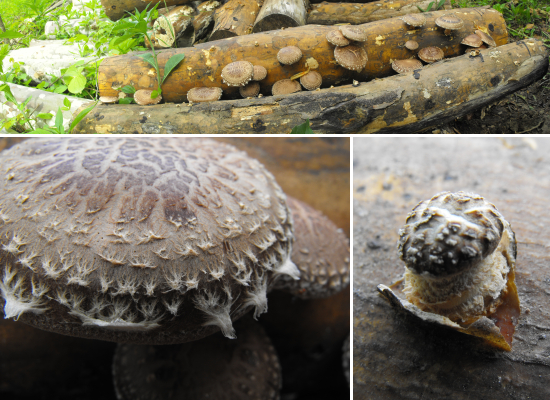
Best tree species for shiitake logs

The word "shiitake"
literally means "oak mushroom," so it's no surprise that red and white
oaks are widely considered to be the best American trees to cut for
shiitake production. But what if you live in a low and wet area with few
oaks present? We've successfully fruited shiitakes on sycamores in the
past (as you can see above), but with another set of plugs arriving in
the middle of February, I wanted to expand our host trees. Based on
about a dozen websites, here's an analysis of the best to worst eastern
U.S. trees for shiitake production.
Best:
- White oak --- a bit slower to produce the first harvest than red oak, but widely considered to be the best species for shiitake production
- Red oak --- a close second
Nearly as good:
- Sweetgum --- Logs only last two to three years, but very productive
- Ironwood --- Logs only last two to three years, and are slow to fruit in the first place, but produce good harvests in the interim
- Sugar maple --- Bark can damage easily when logs are moved, but otherwise a good species
- Beech --- Same caveat as sugar maple
Some sites list these as excellent, some as only fair:
- Chestnut
- Hop hornbeam
- Black willow
Good to fair:
- Cherry --- Specifically good for warm-weather strains and Night Velvet
- Bitternut hickory (and possibly other hickories, but several sites list bitternut as good and all other hickories as bad)
- Black birch --- The mushrooms in early flushes are small, but the logs improve with age. Good for Double Jewel and Native Harvest.
- Black gum --- Logs don't last long.
- Red maple --- Some say to avoid, but Field and Forest says to use with warm-weather strains, Double Jewel, and Native Harvest
- Live oak
- Alder
- Eucalyptus
- Sycamore
- Basswood
- Yellow birch
- Butternut
- River birch
- Silver maple
Possibly to be avoided (although some sites list these as fair to good):
- Ash
- Sassafras (Field and Forest says these logs are okay and have the benefit of being drought tolerant)
- Tulip poplar
- Aspen
- Paper birch
- Elm
Definitely to be avoided:
- Conifers
- Fruit trees
- Hackberry
- Sourwood
- Dogwood
- Black locust
- Walnut
In addition to species, you
should consider the growth habit and location of the tree. Fertile sites
produce good mushroom logs, probably because the trees grow quickly and
have little of the inedible-to-shiitakes heartwood and lots of sapwood
instead. Similarly, rocky hillsides and wet places tend to produce logs
lower in nutrients from a mushroom point of view.
Mark and I need about
eighteen logs for our upcoming mushroom-plugging day, and I'm thinking
of trying at least three or four species from the top of this list to
get an idea for which species work best here. I can definitely come up
with some ironwood and beech, and maybe even an oak within carrying
distance of our core homestead. Time to explore the woods with shiitakes
in mind!
Want more in-depth information? Browse through our books.
Or explore more posts by date or by subject.
About us: Anna Hess and Mark Hamilton spent over a decade living self-sufficiently in the mountains of Virginia before moving north to start over from scratch in the foothills of Ohio. They've experimented with permaculture, no-till gardening, trailersteading, home-based microbusinesses and much more, writing about their adventures in both blogs and books.
Want to be notified when new comments are posted on this page? Click on the RSS button after you add a comment to subscribe to the comment feed, or simply check the box beside "email replies to me" while writing your comment.

I'm curious to know where you got the information on tree species and mushrooms. A neighbor and I have been trying to figure out which tree species would be good for both hen of the woods and chicken of the woods mushrooms, with no luck on finding the info needed. Can you recommend a website?
Thanks.